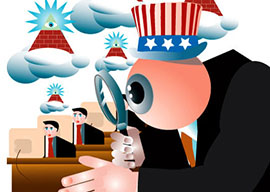
December 06, 2010

The government is watching you in more ways than I have space for, so it’s little surprise that someone within the apparatus was outraged enough to expose the government to its overexposed citizens. Thanks to him, her, or them, we”ve been able to read what the military is doing in Afghanistan and Iraq and what America’s representatives overseas are doing in our name. They read our mail, so we might as well read theirs. Government officials and their media apologists howl with fury and demand Julian Assange’s arrest and execution, but we are expected to keep quiet when the government watches us. Let’s face it”there are things worth watching. Our elected representatives, our diplomats, and our soldiers are our employees. We ought to know how they spend our money and whether they are disobeying the law, especially when it involves kidnapping and torture.
The population, whose long-term jobless are about to lose governmental financial assistance, is becoming restive. Its money is transferred to financial-service managers who produce nothing. Twenty percent of the federal budget goes to the Pentagon. This pays for the wars our soldiers must fight, the 700-plus bases and other facilities it maintains overseas, spying at home and abroad, and developing weapons that have long passed any positive function. The wars in Afghanistan and Iraq have cost more than a trillion dollars, which might have been better spent by the Americans who earned that money, or at least used for education, healthcare, and the increasingly poor underclass. The people are under siege by government and its primary beneficiaries among the arms makers and bankers, so someone must keep an eye on the masses for signs of resistance. Guess who pays for that? You do, sucker.
Noam Chomsky said recently that “one of the major reasons for government secrecy is to protect the government from its own population.” Break the secrecy, and the population can at least see what is being done in its name. I don”t know the government’s public-relations budget, but it is probably fairly large. Every agency has a spokesperson whose task is to spin or conceal what those agencies are doing. It is interesting, once in a while, to see behind that obfuscation to the raw data.
It happened when the Iranian students who seized the U.S. Embassy in 1979 pieced together the thousands of documents the CIA and diplomats had shredded. They published more than forty volumes of diplomatic cables that revealed a concerted policy of subversion and contempt for democratic opposition to American-backed dictators in the Middle East. The “Den of Spies” books were the equivalent of today’s Wikileaks revelations, and the U.S. government was as angry then as it is now that anyone had a peek at what it was saying and doing. When the journalist, teacher, and civil-rights worker William Worthy brought the volumes into Boston’s Logan Airport in 1981, the CIA and FBI seized them. Worthy sued, and the courts awarded him his purloined documents and $16,000 compensation. (The books had been sold in Iranian bookshops, where thousands of copies had been sold. I bought a set at the same time Worthy did, but I donated mine to a London library.)
The Internet permits Wikileaks to make its documents available to the public without risking their seizure at an airport. The U.S. government is pursuing Julian Assange with more vigor than it did William Worthy. It has shut down his website where it can, and it is threatening to prosecute him under, you guessed it, 1917’s Espionage Act. Those of us who are tired of being watched and would like to go on watching the watchers owe our support to Wikileaks.